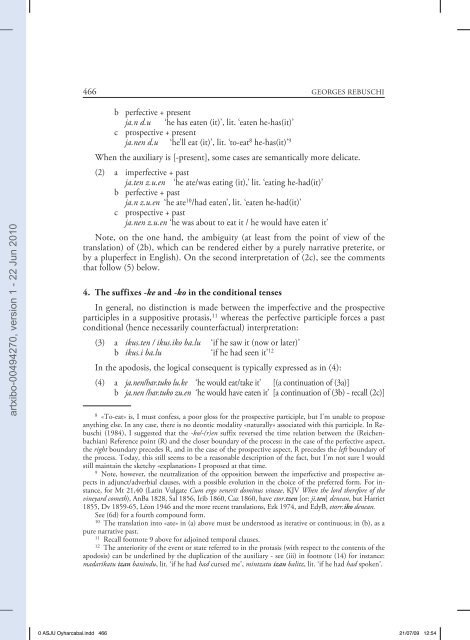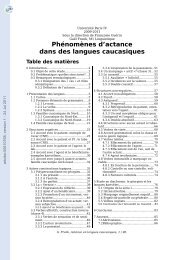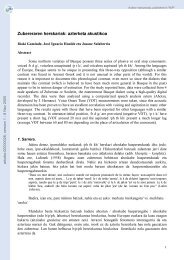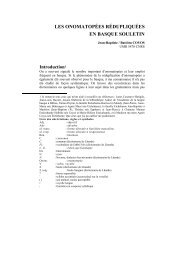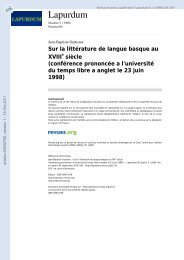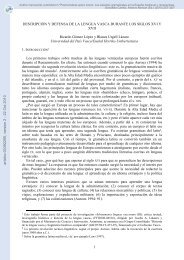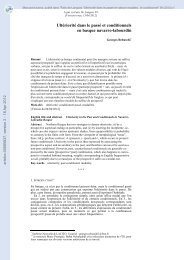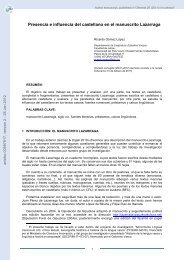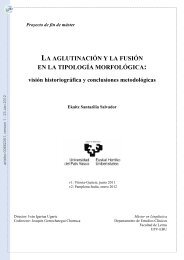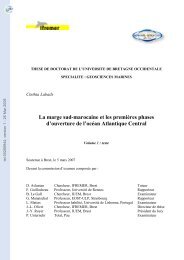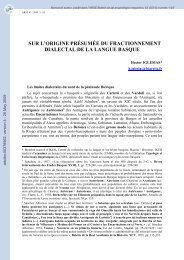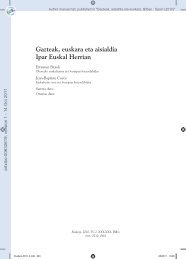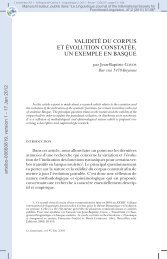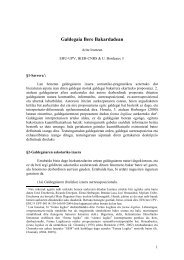On the polysemy of the suffike-ke in the history of Northern Basque
On the polysemy of the suffike-ke in the history of Northern Basque
On the polysemy of the suffike-ke in the history of Northern Basque
Create successful ePaper yourself
Turn your PDF publications into a flip-book with our unique Google optimized e-Paper software.
artxibo-00494270, version 1 - 22 Jun 2010<br />
466 GEORGES REBUSCHI<br />
b perfective + present<br />
ja.n d.u ‘he has eaten (it)’, lit. ‘eaten he-has(it)’<br />
c prospective + present<br />
ja.nen d.u ‘he’ll eat (it)’, lit. ‘to-eat 8 he-has(it)’ 9<br />
When <strong>the</strong> auxiliary is [-present], some cases are semantically more delicate.<br />
(2) a imperfective + past<br />
ja.ten z.u.en ‘he ate/was eat<strong>in</strong>g (it),’ lit. ‘eat<strong>in</strong>g he-had(it)’<br />
b perfective + past<br />
ja.n z.u.en ‘he ate 10 /had eaten’, lit. ‘eaten he-had(it)’<br />
c prospective + past<br />
ja.nen z.u.en ‘he was about to eat it / he would have eaten it’<br />
Note, on <strong>the</strong> one hand, <strong>the</strong> ambiguity (at least from <strong>the</strong> po<strong>in</strong>t <strong>of</strong> view <strong>of</strong> <strong>the</strong><br />
translation) <strong>of</strong> (2b), which can be rendered ei<strong>the</strong>r by a purely narrative preterite, or<br />
by a pluperfect <strong>in</strong> English). <strong>On</strong> <strong>the</strong> second <strong>in</strong>terpretation <strong>of</strong> (2c), see <strong>the</strong> comments<br />
that follow (5) below.<br />
4. The suffixes -<strong>ke</strong> and -ko <strong>in</strong> <strong>the</strong> conditional tenses<br />
In general, no dist<strong>in</strong>ction is made between <strong>the</strong> imperfective and <strong>the</strong> prospective<br />
participles <strong>in</strong> a suppositive protasis, 11 whereas <strong>the</strong> perfective participle forces a past<br />
conditional (hence necessarily counterfactual) <strong>in</strong>terpretation:<br />
(3) a ikus.ten / ikus.iko ba.lu ‘if he saw it (now or later)’<br />
b ikus.i ba.lu ‘if he had seen it’ 12<br />
In <strong>the</strong> apodosis, <strong>the</strong> logical consequent is typically expressed as <strong>in</strong> (4):<br />
(4) a ja.nen/har.tuko lu.<strong>ke</strong> ‘he would eat/ta<strong>ke</strong> it’ [(a cont<strong>in</strong>uation <strong>of</strong> (3a)]<br />
b ja.nen /har.tuko zu.en ‘he would have eaten it’ [a cont<strong>in</strong>uation <strong>of</strong> (3b) - recall (2c)]<br />
8 «To-eat» is, I must confess, a poor gloss for <strong>the</strong> prospective participle, but I’m unable to propose<br />
anyth<strong>in</strong>g else. In any case, <strong>the</strong>re is no deontic modality «naturally» associated with this participle. In Rebuschi<br />
(1984), I suggested that <strong>the</strong> -ko/-(r)en suffix reversed <strong>the</strong> time relation between <strong>the</strong> (Reichenbachian)<br />
Reference po<strong>in</strong>t (R) and <strong>the</strong> closer boundary <strong>of</strong> <strong>the</strong> process: <strong>in</strong> <strong>the</strong> case <strong>of</strong> <strong>the</strong> perfective aspect,<br />
<strong>the</strong> right boundary precedes R, and <strong>in</strong> <strong>the</strong> case <strong>of</strong> <strong>the</strong> prospective aspect, R precedes <strong>the</strong> left boundary <strong>of</strong><br />
<strong>the</strong> process. Today, this still seems to be a reasonable description <strong>of</strong> <strong>the</strong> fact, but I’m not sure I would<br />
still ma<strong>in</strong>ta<strong>in</strong> <strong>the</strong> s<strong>ke</strong>tchy «explanation» I proposed at that time.<br />
9 Note, however, <strong>the</strong> neutralization <strong>of</strong> <strong>the</strong> opposition between <strong>the</strong> imperfective and prospective aspects<br />
<strong>in</strong> adjunct/adverbial clauses, with a possible evolution <strong>in</strong> <strong>the</strong> choice <strong>of</strong> <strong>the</strong> preferred form. For <strong>in</strong>stance,<br />
for Mt 21,40 (Lat<strong>in</strong> Vulgate Cum ergo venerit dom<strong>in</strong>us v<strong>in</strong>eae, KJV When <strong>the</strong> lord <strong>the</strong>refore <strong>of</strong> <strong>the</strong><br />
v<strong>in</strong>eyard cometh), AnBa 1828, Sal 1856, Irib 1860, Caz 1860, have etor.tzen [or: ji.ten] denean, but Harriet<br />
1855, Dv 1859-65, Léon 1946 and <strong>the</strong> more recent translations, Ezk 1974, and EdyB, etorr.iko denean.<br />
See (6d) for a fourth compound form.<br />
10 The translation <strong>in</strong>to «ate» <strong>in</strong> (a) above must be understood as iterative or cont<strong>in</strong>uous; <strong>in</strong> (b), as a<br />
pure narrative past.<br />
11 Recall footnote 9 above for adjo<strong>in</strong>ed temporal clauses.<br />
12 The anteriority <strong>of</strong> <strong>the</strong> event or state referred to <strong>in</strong> <strong>the</strong> protasis (with respect to <strong>the</strong> contents <strong>of</strong> <strong>the</strong><br />
apodosis) can be underl<strong>in</strong>ed by <strong>the</strong> duplication <strong>of</strong> <strong>the</strong> auxiliary - see (iii) <strong>in</strong> footnote (14) for <strong>in</strong>stance:<br />
madarikatu izan ban<strong>in</strong>du, lit. ‘if he had had cursed me’, m<strong>in</strong>tzatu izan balitz, lit. ‘if he had had spo<strong>ke</strong>n’.<br />
0 ASJU Oyharcabal.<strong>in</strong>dd 466 21/07/09 12:54


